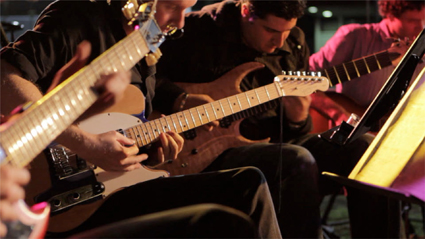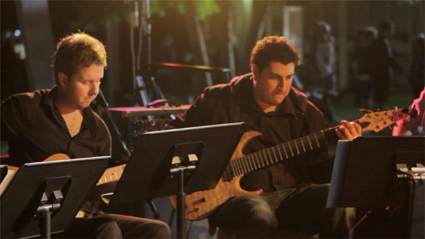another audience, guitar with a difference
oliver downes: chronology arts, ampere quartet, amped, aurora festival

Amped, Chronology Arts and Ampere Quartet
photo Hospital Hill
Amped, Chronology Arts and Ampere Quartet
ANOTHER THURSDAY EVENING IN PENRITH: THE RETREATING SUN THROWING THE BLUE MOUNTAINS INTO SILHOUETTE, FLOCKS OF CHITTERING PARROTS SETTLING AMONG THE LEMON-SCENTED GUMS, A SEA OF BRAKE LIGHTS GLITTERING ALONG THE M4.
Meanwhile on the grass and raw dirt ‘community space’ between the plaza, the area’s venerable mall and the Joan Sutherland Centre (its more recent rechristening “The JOAN” sitting uneasily with its determinedly highbrow aspirations), groups of young people huddle in clusters, hanging out, catching up and filching cigarettes while experimental guitar quartet Ampere present Amped, a free performance of works recently commissioned through Chronology Arts.
Julian Day’s appropriately named Dusk matched the lengthening twilight, wrenching descending tones from Zane Banks’ solo electric guitar, punctuated only by the dull murmur of teenage courtship. Next was Steffan Ianigro’s Music of Symmetry, wailing dissonance counterbalanced with closely spaced, almost claustrophobic chords; a stepwise ascent suggesting impending horror. A strange atmosphere resulted, the well-mannered attention offered by dedicated nu-classical listeners on the grass sitting at odds with random yelps of female laughter, Ianigro’s careful conducting of the quartet (Banks, his brother Jy-Perry, Matt McGuigan and Mat Kurukchi) seeming overly precise beneath the fluorescent glare of the mall.

Matt McGuigan, Mat Kurukchi, Amped
photo Hospital Hill
Matt McGuigan, Mat Kurukchi, Amped
Fausto Romitelli’s TV Trash Trance, presented by Jy-Perry Banks on solo electric guitar, was apparently not to the liking of some, “Fuck you!” being yelled in the background— though it was unclear at whom the ‘you’ was directed. Although the volume was criminally low (Banks’ curly mop failed to flail nearly enough), the whirring loops of static established early in the piece provided ample basis over which to squeal and whine in the latter portion, the sound of a faulty connection being used to rhythmic effect before the lot collapsed into Lovecraftian sludge, eliciting some enthusiastic applause from at least one group of junior critics.
Alex Pozniak’s Small Black Hole, followed suit, the quartet gradually building a sliding, groaning texture redolent of the collapse of buildings or tectonic drift. Amid the shifting layers, tremolos suggested the distant ascent of a space shuttle, the hulking sound of aircraft engines emerging from dobro-style slides. While kids stole each other’s baseball caps, providing a clear invitation for a good chasing, a cataclysmic crash loomed in the air, the music spiralling towards an unavoidable impact before fading to nothing. Well received and highly effective.
The experiment in community engagement was rounded off with Phill Niblock’s Guitar two, for four. Emerging unhurriedly from its opening drones, the work was accompanied by a complementary black and white film (as is Niblock’s wont) featuring industrial imagery—gauges, whirring gears, liquid metal being poured—matched to piercing overtones, the guitar’s potential for violence finally unleashed, a blaring surface licked by flares of feedback perhaps unavoidably bringing to mind the consumption of workers’ bodies in Metropolis. And that was that, scattered applause dispersing amid puffs of underage smoke.
Aurora Festival of Living Music: Chronology Arts and Ampere Quartet, Amped, Joan Sutherland Performing Arts Centre, May 10; www.auroranewmusic.com.au
RealTime issue #109 June-July 2012 pg. web






